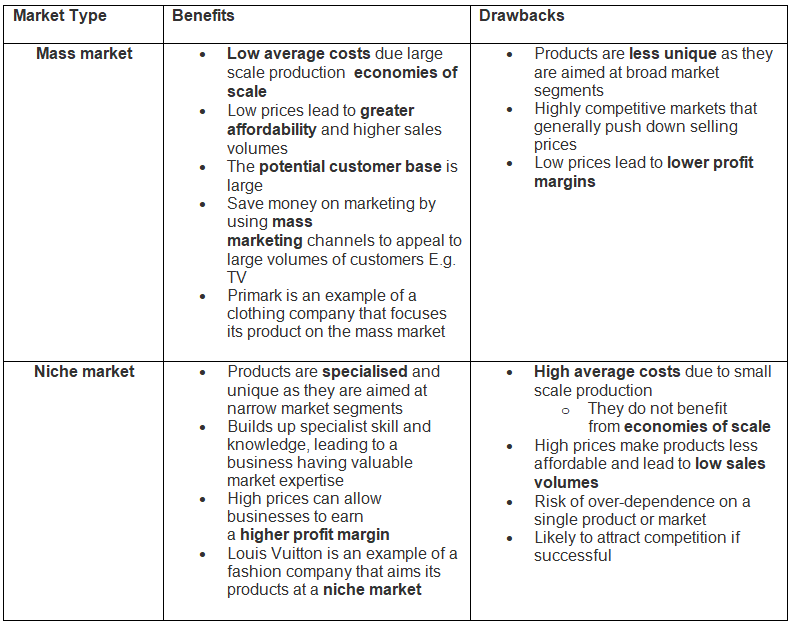Class 10 Exam > Class 10 Notes > Business Studies for GCSE/IGCSE > Niche & Mass Marketing
Niche & Mass Marketing | Business Studies for GCSE/IGCSE - Class 10 PDF Download
Niche & Mass Marketing
- Mass markets target broad segments of the market:
- Mass marketing entails selling products to a vast portion of the available market.
- Production typically occurs on a large scale.
- Products are generally standardized with minimal differentiation.
- Kellogg's Corn Flakes exemplifies a breakfast cereal brand aimed at the mass market.
- Niche markets focus on specific subsets within the larger market, such as gluten-free products:
- Niche marketing involves identifying and meeting the needs of a small consumer group within the broader market.
- Production is usually on a smaller scale.
- Products may be customized or tailored to specific customer requirements.
- Bob’s Red Mill is renowned for offering a range of high-quality gluten-free foods, including various breakfast cereals.
- Some niche markets evolve into mass markets as larger businesses recognize growth potential:
- For instance, energy drinks initially targeted niche consumers engaged in fitness activities.
- With decreasing prices and expanded choices, energy drinks have transitioned into mass-market products.
Question for Niche & Mass MarketingTry yourself: What is the main characteristic of mass marketing?View Solution
Evaluating Mass Markets & Niche Markets

The document Niche & Mass Marketing | Business Studies for GCSE/IGCSE - Class 10 is a part of the Class 10 Course Business Studies for GCSE/IGCSE.
All you need of Class 10 at this link: Class 10
|
70 videos|93 docs|26 tests
|
FAQs on Niche & Mass Marketing - Business Studies for GCSE/IGCSE - Class 10
| 1. What is the difference between niche marketing and mass marketing? |  |
Ans. Niche marketing focuses on a specific segment of the market with unique needs, while mass marketing targets a larger, more general audience.
| 2. How can companies determine whether to use niche or mass marketing strategies? |  |
Ans. Companies should consider factors such as the size of the target market, competition, and the uniqueness of their product when deciding between niche and mass marketing.
| 3. What are the advantages of niche marketing over mass marketing? |  |
Ans. Niche marketing allows companies to tailor their products and marketing efforts to a specific audience, resulting in higher customer loyalty and less competition.
| 4. Are there any disadvantages to niche marketing? |  |
Ans. One disadvantage of niche marketing is the limited market size, which can restrict growth opportunities compared to mass marketing strategies.
| 5. Can companies combine niche and mass marketing strategies? |  |
Ans. Yes, companies can use a combination of niche and mass marketing strategies to target specific segments of the market while still reaching a broader audience.
Related Searches















